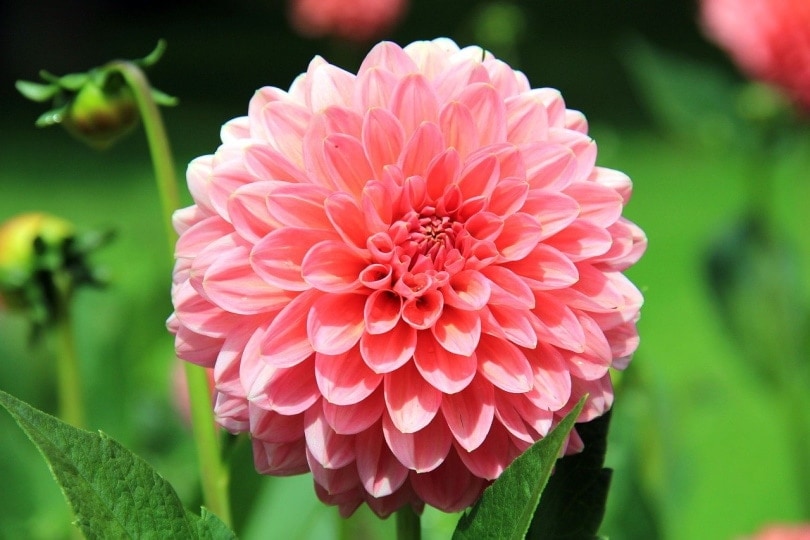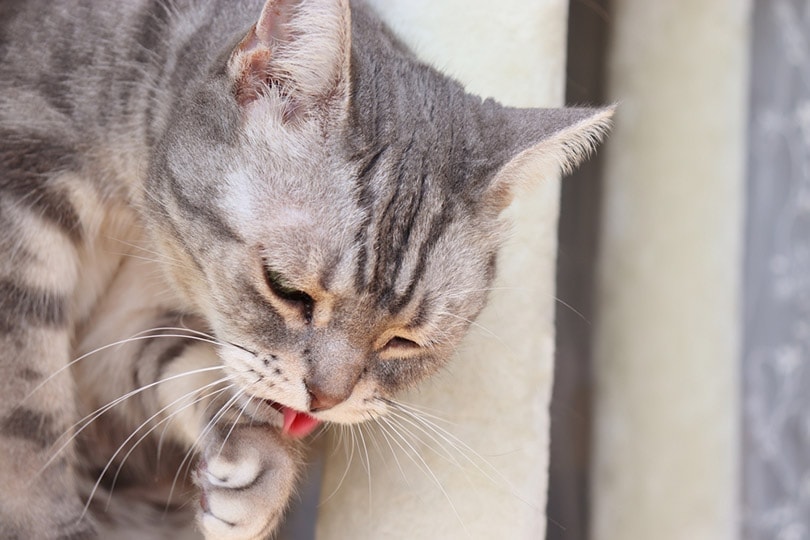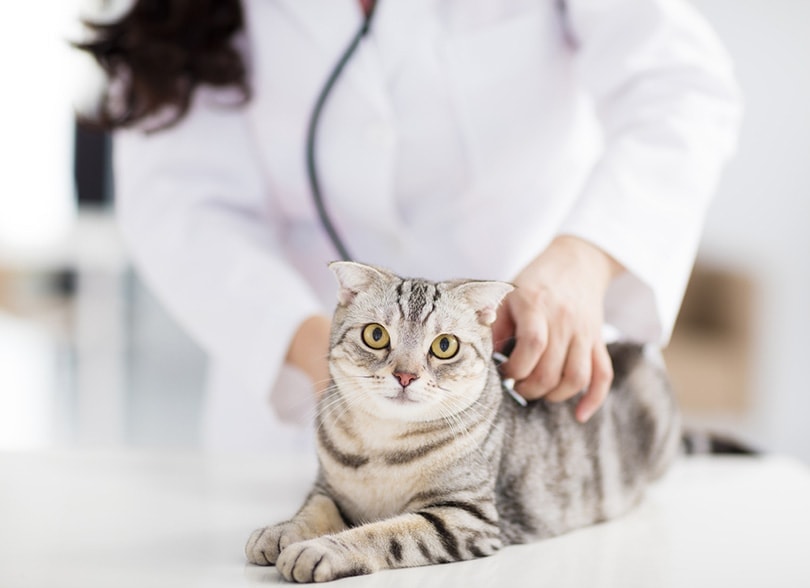Are Dahlias Poisonous to Cats? Keeping Your Cat Safe
Updated on

Click to Skip Ahead
Dahlias are absolutely beautiful flowers and a common choice for those looking to spruce up their home with some freshness. However, dahlias are unfortunately quite toxic to felines. In fact, these flowers are toxic to nearly every species according to the ASPCA, including both dogs and horses.1 Humans may even experience bad reactions if they eat enough of them.
Luckily, though, dahlias are rarely deadly to felines. They’re only mildly toxic, causing uncomfortable signs, but rarely anything bad enough to cause death. For instance, the most common signs are minor gastrointestinal symptoms, like upset stomach, vomiting, and diarrhea.
Of course, that doesn’t mean that they can’t kill cats, though. Some cats may be particularly prone to problems, such as the very young and very old. Those who already have gastrointestinal problems may experience more serious signs as well.
Signs of Dahlia Poisoning in Cats
Very rarely do people catch their cat in the act of eating dahlias. However, if you have them in the house and your cat can access them, then there is always the chance that they may eat them.
Fortunately, symptoms are usually not serious and go away on their own after a short period. Some cats may eat them and not outwardly look sick at all. Cats are extremely good at hiding their signs, which is a survival mechanism they developed after thousands of years in the wild. Therefore, if your cat just has a small stomach ache, you probably aren’t going to notice.

However, severe reactions can occur. Therefore, it is vital that you keep an eye on your feline just in case they get into trouble.
- Skin irritation
- Nausea
- Vomiting
- Loss of appetite
- Lethargy
- Unstable gait
- Loss of coordination
As you might guess, small amounts of vomiting usually aren’t serious and can be treated at home. Signs typically go away quickly, so if the vomiting sticks around, it may be time to call your vet. Serious signs like lethargy and unstable walking may also prompt a trip to the vet for supportive care.
If you need to speak with a vet right now but can’t get to one, head over to JustAnswer. It’s an online service where you can talk to a vet in real time and get the personalized advice you need for your pet — all at an affordable price!
Treatment of Dahlia Poisoning in Cats
Currently, there is no direct treatment for dahlia poisoning. There is no medicine that your vet can prescribe to counteract the dahlia poisoning and stop the effects. Therefore, most treatments are supportive (if your cat needs them, of course).
The idea is to get the cat through the signs of dahlia poisoning alive. Typically, this includes fluid therapy, which will keep the cat hydrated. If the cat is vomiting a lot, they are likely going to lose a lot of liquids, which can be dangerous in itself. Furthermore, extra fluids help water down the toxin, which may lessen its effects.
Through the use of fluid therapy, your cat should show an improvement of symptoms within a few hours. This isn’t a condition that they’re going to need support over days, especially if they are receiving care from a vet. Supportive care may also include anti-nausea injections as well.
Of course, vets will typically recommend removing the plant from the home after poisoning. While you’d imagine that cats would avoid it after their scare, they don’t always understand that the flower caused their pain, and you can’t exactly explain it to them.

Dahlia Poisoning Prognosis
As we’ve stated, you typically don’t have to worry about your cat dying from dahlia poisoning. In most cases, signs are mild and can be monitored at home. Usually, signs last for about 48 hours, though this will vary from cat to cat.
Remember, just because your cat is acting fine doesn’t mean that they’re 100% better. Often, cats will act better when they are mildly sick since they’re naturally prone to hiding their signs.
After the toxins wear off, most cats make a speedy recovery and are their old selves in only a few days. Typically, this is not a long-term illness and dissipates quickly.
While most cats don’t need to visit a vet, those that develop more serious symptoms often will. In this case, your cat may take longer to recover simply because they had more serious symptoms. Typically, cats will not need to have multiple vet appointments after they are released unless there are serious complications.
Some felines may experience worse signs if they have an underlying illness. If this is the case, your vet will likely want to keep an eye on your cat for a little longer. Cats that are already chronically ill may have a harder time recovering.
Your vet may recommend switching to a gentler food for a short period of time following the illness. The digestive system may need time to heal, and your cat will likely be more prone to digestive upset while they recover. However, you shouldn’t need to keep their food changed forever. Plus, some cats may recover very quickly and not need it at all.

When to Contact a Vet
If you simply notice your cat nibbling on a dahlia, you likely don’t need to rush them off to the vet unless they have an underlying gastrointestinal problem or anything that messes with their hydration. If they’re healthy cats, they may not exhibit any symptoms at all and, therefore, not need any supportive care.
However, if your cat begins to vomit excessively, refuses to eat for longer than 24 hours, or acts extremely lethargic, a trip to the vet might be in order. The main concern is that the cat will get dehydrated, which can cause further complications. In some cases, dehydration can be deadly.
Therefore, it is not a matter of the dahlia toxins themselves causing serious illness but the lack of fluids that are often caused by the toxins. Luckily, intravenous fluids can quickly rehydrate your cat and help in their recovery.
If your cat is acting fine, there is little need to contact your vet. Cats that aren’t losing much water through vomiting and are still drinking are likely to get better on their own quickly.
With that said, any time you are worried about your cat, you should call your vet. The worst thing they can say is to monitor your cat at home and not worry about bringing them in.
Conclusion
Dahlias are technically toxic to cats. However, they are only mildly toxic. Therefore, they don’t actually cause many serious signs, and most cats get better within a day or so. In fact, some cats don’t show symptoms at all. Any signs that do occur are usually extremely mild and don’t require treatment.
With that said, some cats will experience worse signs than others and need extra support from your local vet’s office. In this case, the feline will often be given fluid therapy, which helps prevent them from becoming dehydrated.
Cats rarely die from dahlia poisoning. Those who experience worse symptoms usually have an underlying problem that makes them more vulnerable. Luckily, dahlia toxins only last for about 48 hours in the digestive tract. After that, all signs should clear up.
Of course, if your cat seems to be struggling, it is always a good idea to take them to the vet as soon as possible.
Related Reads:
- Is Echeveria Toxic to Cats? Keeping Your Cat Safe!
- Is Aglaonema Toxic to Cats? Keeping Your Cat Safe
Featured Image Credit: AnnaER, Pixabay












